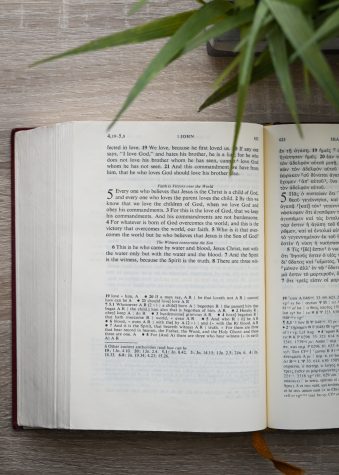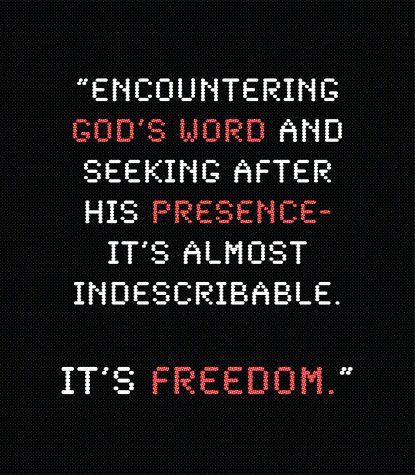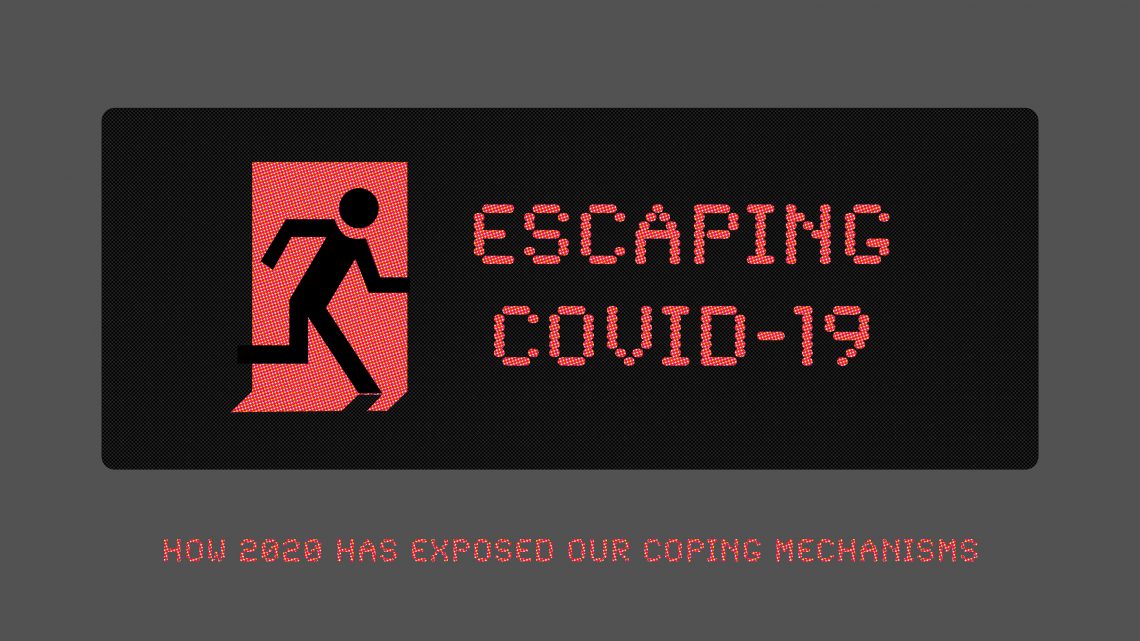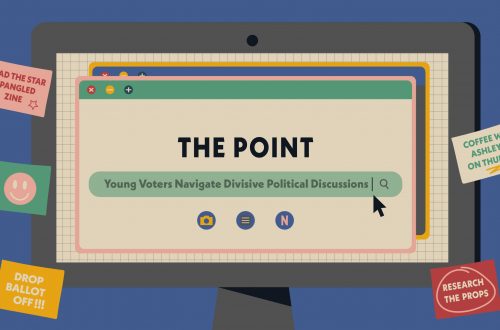Written by Addi Freheit, edited by Lily Journey, designed by Phoebe Han, photographed by Brooke Schimmels
After Northwest University junior English major Emma McFarland watched a season of “Schitt’s Creek” within 24 hours, she realized something needed to change.
“It goes back to the idea that this isn’t how things are supposed to be,” McFarland explained about spending time on Netflix and Instagram. “When I feel that in my life, I long for a little bit of… escapism.”
With the onslaught of the COVID-19 pandemic, the world has spent much of 2020 groaning with the knowledge that this is not how things are “supposed” to be. Social isolation, a heightened political climate and fear for the lives of loved ones have all contributed to a global increase in anxiety and depression. In addition to these stress-inducing factors, people have been stripped of their usual ways of coping, such as spending time with friends or going to the gym.
Some have chosen to fight the temptation of giving into negative coping mechanisms and have found healthy ways to alleviate the uncomfortable emotions they face. Many others have turned to extreme behaviors for an escape from the reality of their situation. Instead of an escape, these people have only found the numb detachment of avoidance.

DISTINGUISHING BETWEEN UNHEALTHY AND HEALTHY COPING MECHANISMS
Biola sophomore Josiah Brimmage understands that “an unhealthy coping mechanism is something that distracts. It doesn’t deal with the problem; it just puts it on a side burner or neglects it completely.”
These distractions can include something as seemingly harmless as spending hours binge-watching Netflix, or an activity as heavily warned against as substance abuse. According to Therapist Aid, unhealthy coping mechanisms provide temporary relief at the cost of long-term harm.
For example, coping with school-related stress by going on Instagram may briefly distract a student from the large project due that evening. But procrastinating may also burden them with an increase in stress, negatively affect their work and result in a lower grade. A situation as extreme as the global outbreak of COVID-19 has consequently driven people to more extreme behaviors of escapism with longer lasting negative effects. These behaviors include drug abuse and heavy porn usage.
This escapism can feel fantastic in the moment, but it only delays the inevitable. When the phone is finally put down and the TV finally turned off, the emotions shoved aside remain to be dealt with.
In contrast, healthy coping mechanisms may seem unhelpful in the moment, but they bring long-term positive change.
After McFarland realized the escapist nature of her behavior and acknowledged feeling drained after binge-watching Netflix, she decided to read a book a week. She also set time limits on her social media.
Like McFarland, Brimmage exchanged time on Instagram for purposeful activities found outside of the phone.
“I was reminded that God calls us to be good stewards of everything he has given us,” Brimmage said. “I felt like there were much better ways I could be stewarding my time than constantly being on my phone or just lying around.”
Brimmage has since been motivated to find activities that stimulate his creativity, such as playing guitar and reading books.
“Being active and finding creative outlets just plain made me feel better,” Brimmage said. “I had more energy, was in a better mood and found myself more motivated to accomplish the tasks I had for the day.”
Reading, going outside, spending socially-distanced time with others, painting and playing an instrument are all ways to engage with the current circumstances instead of escaping from them. These activities encourage mindfulness, an acknowledgment of emotion and a participation in the real world. They can stimulate longer effects of joy because they are not dependent on ignoring the situation at hand.

THE NUANCE OF “GOOD” AND “BAD” COPING MECHANISMS
Sometimes healthy and unhealthy coping mechanisms depend on how the activity is used rather than what the activity is. Watching a few episodes of TV before bed is not inherently bad. Virtually any action—whether stereotypically viewed as “good” or “bad”—can become an unhealthy coping habit if it becomes a necessity to distract from reality.
“At the beginning, I think everybody was pretty sad coming home and mourning the loss of our school year… it was a coping mechanism to just lie in bed and basically do nothing,” Brimmage said. “I think there is a time and place for that, and [those actions are] totally understandable.”
The use of healthy coping mechanisms will not always bring an obvious sense of emotional progress or peace. Distractions are appealing because they falsely convince people that their problems have been solved, when those problems have only disappeared out of sight and out of mind. People take different amounts of time to come to terms with their circumstances and it is unfair to judge them based on the illusion of acceptance.
“We might both be coping with something in a healthy way and you might be further along than I am, but that doesn’t mean necessarily that I’m [not] doing it right,” Brimmage explains. “People [require] different times to adjust or cope with something.”
THE SPIRITUAL DISCIPLINES AS COPING MECHANISMS
For Christians, trials are a critical time to confront their habitual coping mechanisms, including their use of spiritual disciplines and dependence on God. Many neglect their faith when they go through difficult times because challenging circumstances can appear to contradict what Christians know about God’s goodness and love. Other believers find that hardship encourages them to root themselves in the promises of God and learn to depend on him in new ways.
After McFarland traversed challenging circumstances during her first and only two years at Washington State University, she was forced to come home, where her faith faced the chopping block.
“I remember just putting my Bible away, just putting it in a closet,” McFarland said. “And I didn’t take it out for six months. I didn’t go to church. I didn’t touch any of that… [This year] was different because I knew that God was there; He just wasn’t [there] in the way that I wanted him to be.”
McFarland described her prayer life at the beginning of quarantine as angry and frustrated, but this began to change when she saw God’s “faithful encouragement in the lives of [her] friends.” As she continued to invest in her community, McFarland gained a greater perspective of the work God was doing in her life.
“I began to see the beauty in time I could spend with my family, and realized this season was one of learning intentionality in friendships,” McFarland said. “These realizations encouraged me to ask [God] to help me see his loving work and to give me contentment and joy in the things I don’t understand.”
McFarland identified meeting with her church’s community group on Zoom, spending time with her brother and having a room at her parents’ house as things that point to God’s goodness. Despite expressing that it is easier to go on Instagram than to pray, McFarland’s focus on seeing God’s gifts changed her perception of this hard year.

In addition to actively looking for things to be thankful for, McFarland’s humble prayers opened an opportunity for God to change her heart toward these hardships. God designed his people for joy and peace, even as they face tribulation. It is impossible to will oneself toward contentment, but the Lord promises his helper—the Holy Spirit—to meet his children in the areas they lack.
“Encountering God’s word and seeking after his presence–it’s almost indescribable. It’s freedom,” Brimmage said. “You might feel that temporarily with those other things, but when you’re walking with God, [that freedom is] constant.”
Brimmage expressed that nothing—not playing guitar or gathering with friends—compares to being in God’s presence. For the believer, spending time in God’s word, praying and worshipping with the body of Christ are the perfect coping mechanisms. The Lord is the one that provides true joy, hope and peace, even when life is in chaos. His sons and daughters have the privilege of coming to him with their pain—not to receive an escape from hardship, but to receive the strength and perseverance needed to navigate trial.





